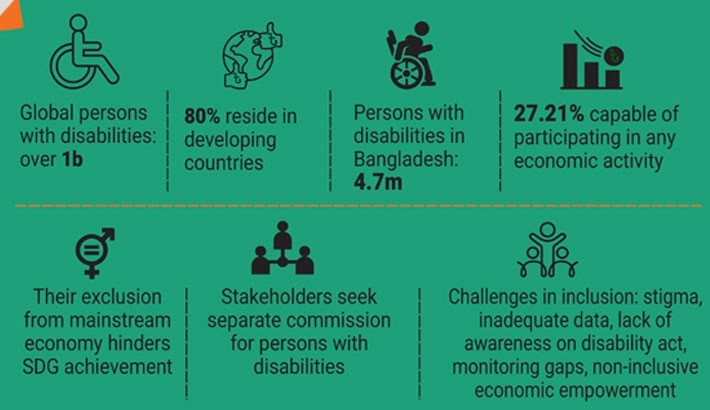Empowering Persons With Disabilities
A critical focus for achieving SDGs
Rafikul Islam, Dhaka
Published: 03 Dec 2023

Jahidul Islam has been working at the United Nations Population Fund (UNFPA) as a National Disability Coordinator for over two years. Despite a person with a disability, Jahidul did not want to remain confined at home.
“After I completed my MBA, I joined the UNFPA. I have a plan to go abroad to attain PhD degree next year,” Jahidul told the Daily Sun.
He also achieved the Bangladesh Association of Software and Information Services Outsourcing Award in 2013, which is a recognition of his talent.
“People like me want support to prove themselves and want to contribute to the country’s economy. Unfortunately, people like me have to face many challenges in Bangladesh as there is no infrastructure required for our safe movement. Even, there is no separate washroom for us,” he said.
He said he did not have to face any problems when he was in Australia for two years. He said Bangladesh should implement policies to ensure the rights of persons with disabilities.
Experts have also recommended bringing people with disabilities into the mainstream economy by giving them access to education and turning them into manpower so that they can contribute to the economy and help the country achieve SDGs by 2030.
Talking to the Daily Sun, Jillur Rahman, associate director of the Research and Policy Integration for Development, said the government has taken a good number of policies for persons with disabilities, but these should be implemented properly.
“The government should take special programmes for persons with disabilities to build more entrepreneurs. There are scopes to utilise them in the technology sector as they can have a significant contribution,” Jillur Rahman.
A separate commission for persons with disabilities demanded
Experts from UN agencies, Sightsavers, and organisations of people with disabilities (OPDs) in Dhaka said on Saturday Bangladesh needs to focus on persons with disabilities to attain SDGs by 2030.
They also emphasised attention to crucial areas, including the revitalisation of disability committees, increased budget allocation for the National Action Plan on Disability, appointment of disability focal points, enhancement of disability allowances, monitoring and accountability of government disability activities, and consultation of organisations of OPDs in the development process.
Since its proclamation in 1992 by the United Nations General Assembly in resolution 47/3, the United Nations International Day of Persons with Disabilities (IDPD) has been celebrated annually on 3 December around the world.
According to the keynote paper titled, “United in action to rescue and achieve the SDGs for, with and by persons with disabilities – Bangladesh context” presented by UNDP’s Aminul Arifeen and Sightsavers’ Ayon Debnath, non-implementation of laws, accountability and transparency are challenges in the country.
Ayon Debnath said the key challenges are stigma and discrimination, inadequate data, lack of awareness about the Disability Act, absence of monitoring, and economic empowerment not disability inclusive in the country.
Principal Coordinator (SDG Affairs) at the Prime Minister’s Office Md Akhter Hossain emphasised the need for stronger alignment between national SDG indicators and disability inclusion. He also stressed the urgency of reinforcing the implementation of the Rights and Protection of Persons with Disabilities.
Bringing people with disabilities into the mainstream economy
According to a survey conducted by the Bangladesh Bureau of Statistics in 2022, 47.42 lakh people were physically or mentally challenged, in other words, persons with disabilities.
The survey also showed that some 40.55 % of children with disabilities can go to school while 27.21 % can take part in any economic activity. ccording to the World Health Organisation, more than one billion out of eight billion people have some form of disability and 80% of them live in developing countries.

